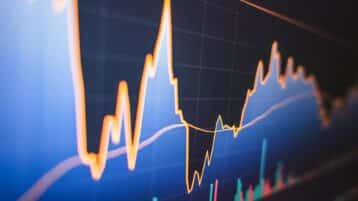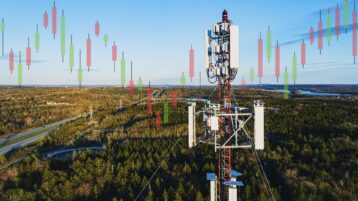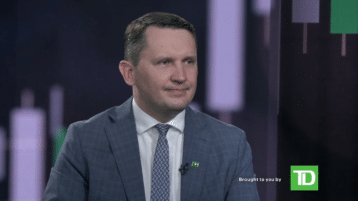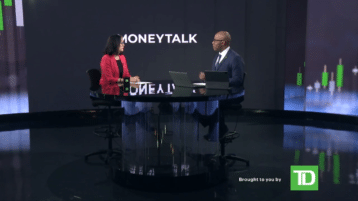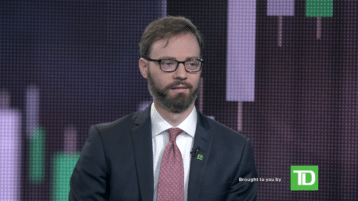Print Transcript
[music] >> Hello, I'm Anthony Okolie sitting in for Greg Bonnell this weekend welcome to MoneyTalk Live, which is brought to you by TD Direct Investing. Coming up on today show, we'll discuss whether there is any signs of optimism for China's economy as it struggles with COVID lockdowns with TD Asset Management's Haining Zha. And in today's WebBroker education segment, we will take you how to use the platform to screen for dividend stocks. And here's how you get in touch with us. Just email moneytalklive@td.com or fill out the viewer response box under the video player on WebBroker. and before we get to our guest today, let's get you an update on the markets. We'll start with the TSX, it's down just about half a percent. Let's turn to south of the border. The S&P 500 is actually just flat right now at 4118. And finally the tech heavy NASDAQ index, it is up slightly, .3% at this time. And that's your market update. China's economy has struggled as it sticks with it zero COVID strategy, which has put major economic areas into full or partial lockdown, but there are some signs of optimism. Joining us now to discuss is Haining Zha, portfolio manager at TD Asset Management. Haining, let's start with those signs of optimism. What's the economic situation in China right now? Okay, it doesn't… Haining, can you hear us? >> I cannot seem to hear. >> We are having some problems with the connection. Let's go back to the TSX. >> I know you are talking to me right now, but unfortunately, I cannot hear you. >> We will take a look at the TSX to see how the market is trading right now. >> Yeah, I can hear you know. >> Okay, the TSX composite index is down about half a percent or just over 100 points at 19,000, 591. Okay, I think we have a connection back welcome, Haining, to the show. Let's start with the signs of optimism in China. What's the economic situation in China right now, what can you tell us? >> Actually, before I go into the economic outlook, I want to briefly mention somegeneral philosophy in investing in yet. He could change the way you view the data points. There are some things we keep in mind. Number one is you have to be a little bit contrarian. Essentially, you want to underweight when the risk is under the radar and overweight when the risk is fully exposed, and number two is you wanna pay attention to the Fed hiking cycle because it will impact the capital flowand changing market and currency dynamics,and three as you want to consistently a pick to the structural winner. Based on this framework, China isn't in a terrible position. It only had 4% year-over-year growth, nonetheless, based on the framework, number one, all of the risks are well exposed, be it COVID risk, economy slowdown risk, and many of these risks are being dealt with or moderated. And number two, the Fed is probably, it was at the end of its hiking cycle. Right now, the market is actually pricing cuts in 2023. And number three, structurally, China is still a large, stable country with a huge consumer base and a very strong industrial production base. none of that has changed. So we maintain more constructive on China for the long-term. >> Now, you touched about the Fed rate hiking cycle, which we've seen, the Fed has increased interest rates recently. How is that impacted Chinese markets? >> Right, so traditionally, there are several channels to channel that impact into the Chinese economy, but I think the biggest one is when the Fed tightens the interest rate too much, then all of the emerging market countries inevitably will need to tighten their rates, so to slow down economic growth. But in this cycle, the dynamic is a little bit different. Because of the COVID disruption, China's actually out of sync with the rest of the economiesso while the Fed is tightening its monetary policy, China is actually gradually moving towards the easing side. But there are still implicit constraints on how much you easing they can do you and I think when the Fed is towards the end of the hiking cycle, there is certainly a lot more, you know, that can be done at this point. And given all of the pressure in real estate and economic numbers, I think we remain optimistic that in the second half, the federal bank will ease rates to support the economy. >> What about some of the risks to the Chinese market right now? What are you sitting there? >> Yeah, I think the 2 Biggest Risks, #1 is COVID because if you look at the second quarter, you know, I think the economic downturn is COVID related. It then there is second the real estate risk. it has been going down for some time. Recently there have been some headlines. Nonetheless, our best case scenario is that the Chinese government can ultimately control our baseline, base case scenario is that the Chinese government can ultimately control… >> Haining Zha from TD Asset Management in a moment. Here is an update on the top business stories in the world today in a look at how the markets are trading. Air Canada reported a loss of $386 million in the second quarter,which was much smaller than expected. The company is benefiting from a rebound and travel. Revenue for the quarter managed to jump nearly fivefold. And while airlines expect travel demand to continue in the second half of the year, the industry does face challenges, mainly from rising labour costs, staffing shortages and higher jet fuel prices. Staying with earnings, Uber reported positivequarterly cash flow for the first time ever. That's because more people were hailing rides and ordering food, helping the company more than double its revenue in the second quarter. The CEO says that the number of people using the platform rose to an all-time high. And finally, sales at Caterpillar missed second-quarter expectations with revenue rising$14.25 billion, which was a little shy of forecasts. The company says that sales were hit by slowing construction activity in China, one of its biggest markets, as well as supply chain issues that have hurt heavy equipment production. And here's how the main benchmark index in Canada is trading right now. The TSX is still down slightly, about half a percent at this time. Let's take a look at the US, the broad-based S&P 500 up just a touch, up about four points to 4122. We'll take a look at the NASDAQ. . . Okay. Okay. All right, we are back with Haining Zha from TD Asset Management, taking your questions about China's economy and markets. The first question from our platform is on technology. What's your outlook for China's Tech sector right now? >> Actually, earlier this year, there was a lot of pressure on Chinese technology companies. It think about COVID pressure, the economic downturn, the regulatory policy pressure. So amid all of these pressures, there is a very pessimistic view on the market that the Chinese technology sector is no longer investable. I certainly don't think so because if you think about some of these headwinds, for sure, the regular Tory policy will change the way that Chinese technology companies operate, but in the end, all of these headwinds will not be there forever. Take Alibaba for example. On the regulatory side, I think internal and externally vetted regulatory investigations are gradually wrapping up. in the last several days, Alibaba just applied for a primary listing in Hong Kong, which is signalling thatthe regulatory headwind is abating. And also in the core company use fundamental side, Alibaba's revenue and earnings depended a lot on the consumption trends in China. And right now, we are seeing consumption gradually returning from the second-quarter downturn. In April, the retail sales year-over-year is down 11%. But the last print in June, the year-over-year number recovered back to 3% positive. Nonetheless, there is still further room to improve. We think, for the long run, Chinese consumption growth should be around somewhere between 6 to 7%, and also, if you think about the valuation side, if you remove some of the investment that these companies make and only looking at their market And core earnings, they are pretty much trading at roughly 10 times the core earnings, which is pretty cheap, which means in the long term they are not a horrible investment. I know that in the last week, Alibaba's stock price had to be a good turn down due to two headlines. Number one, the US SEC decided to put Alibaba on a potential delisting list, and number two, it was reported that the founder will give up his control on and financials. So we drove up the negative sentiment. In my opinion, on the first point,It is not… It is not a sign that the regulatory headwind is increasing. In fact, it is a sign that regulatory pressure is dying down and if Jack Ma decides to give up his control, the end financial IPO is going to be a lot smoother. With the SEC point. . . when the worst cases realize, he won't have an impact on material operation. So for the long run, I think if you invest in our patient enough, it's not a bad investment. >> You know, he talked about valuations, which are fairly attractive right now. You also talked about retail, retail sales in China, which are slowly making their way back. Do you see any potential risks to retail sales going forward, given that China's COVID 19 policy, do you think that is a potential risk for the market going forward? >> Yeah, I think a lot will depend on what happens with COVID. As I mentioned before, in the second quarter, the whole downturn was actually caused by COVID. And of course, the consumer confidence was shaken a little bit because during the COVID pandemic, many people either temporarily or permanently lost their jobs, so their consumption willingness is severely challenged. Even for people with the money, they probably will hesitate and delay their spending because they want to save for future emergency use. Based on the data we are seeing, the household savings is actually increasing 10% year-over-year by June this year, so it's a lot faster than GDP growth, so it's kind of positive and negative news. Negative in the near term meaning that people's willingness to spend is increasing, but in the long run, when the COVID risk is gone and uncertainty removed, then it will help the consumption to recover. > Very good perspective there. We will get to the next question, this one is on trade. What impact would there be if the US lifted trade sanctions on China? >> In my opinion, the chance of that happening is actually pretty slim. The reason is that all because of the midterm election dynamics. So if all of those tariffs are lifted, then the Biden administration could be viewed as being number 1, too soft to put China, and then number two, they are hurting American workers interest. Given the Democratic Party's face a lot of pressure in the midterm election, I don't think it will happen. >> Okay. Let's turn to the next question on renewables. Can you talk to us about China's big push into renewable energy? >> Yeah, absolutely. It is actually a growing area within the Chinese economy. Just to give you some background information, China is the biggest energy consumer in the world, accounting for about 1/4 of the world's total energy consumption. And right now, China has already made a promise that by 2030, it will reach peak carbon emissions and by 2060, it will reach carbon neutral. At the moment, renewable energy as a percentage of primary energy usage or consumption is only 14%. Over time, by 2030, it needs to reach at least about 25%, so there is a lot of room for growth. I'll just give you two examples, solar and wind. Right now, the capacity of solar and wind in China is about 340 GW each. The plan is, by 2030, the some of them together need to reach 1200 GW, which is essentially double the amount of capacity. So this is definitely a growing area. And more importantly, from a bottom-up perspective, the Chinese companies are well positioned to capture this growth. So if you look at the… Either solar or wind. Take solar, for example. Chinese companies account for over 70% of the solar industry in the world, and for wind, it is about 50%. So there are definitely a lot of opportunities for investors in this area. >> Talk about the importance of the electric vehicle sector, particularly when it comes to renewal. How do you see them playing out in China? >> Right, this is an equally exciting area. Again, just to give you the number, China is the largest automaker, otter consumer in the world. On an annual basis, it sells about 25 million units of cars, compared to 17 million in the US. And EV penetration in China is accelerating. The long-term goal is, by 2025, DEV percentage, EV as a percentage of total new vehicle sales need to reach 25%. And in May and June this year, we are already seeing it reached 24%. And the longer term goal is by 2030, it needs to reach 40% of the total new vehicle sales. So there is a lot of room for growth. And also in this area, Chinese automakers are quickly catching up. As we know, Tesla is probably one of the best in the EV space, but some of the Chinese automakers, for example, one of the largest ones, PYD, this year, by June already sold more EVs than Tesla. Although at the moment most of their products are in the low to mid price range, nonetheless, some of its products are competing directly with Tesla. >> Great questions. As always, make sure you do your own research before making any investment decisions. And we'll get back to your questions for Haining Zha on China's economy and markets in just a moment. But first, let's get to today's educational segment. There are many stocks out there that pay dividends, but only a few that can be classified as dividend aristocrats. Here to tell us what those are and how to screen for them is Hiren Amin, senior client education instructor here at TD Direct Investing. thank you for joining us. >> Thank you for having me. > What are dividend aristocrats? >> We know that income investing has the spotlight on it. These are going to be, for those of us who consider ourselves income oriented investors,who are really looking at dividend paying stocks as part of their portfolio towards that end. Now, not all dividend paying stocks are the same. Amongst the dividend payers, there what's known as commoners and then there are what's known as dividend aristocrats. Now, dividend aristocrats are really companies that have a long history of paying dividends, having uninterrupted and consistent dividends and importantly also being able to raise their dividends as well. Now, a company that pays out an ever-increasing dividend is ideal, of course, for investors looking for stable and consistent income, especially those who want to pad their pockets a little bit or perhaps even rely on that income to sustain that lifestyle. It's also a positive signal for company because it means that they have sound financial footing. Now remember, however, that a dividend is a portion of the company's profits that is paying to its shareholders in the form of cash. So that's basically any money that is paid out of that company is not being reinvested in the business. So these tend to be large, established companies that are usually stable with potentially tapered growth. Now many are largely recession proof. They enjoy steady and predictable profits, and that's key here today, to be able to sustain those dividends throughout the years, and they can potentially grow those dividends in good and bad times. Of course, barring black swan events like COVID. >> Let's say I'm interested in the aristocrats. What criteria did they have and can we screen for it? >>absolutely. First let's talk about the criteria. To be considered a dividend aristocrat in Canada, they must meet three criteria. The first criteria is that the company has to be listed on the Toronto Stock exchange,the TSE, and it also has to be part of the S and P Canada BMI index, which is the broad market index. The second criteria and perhaps most important is that the company have increased its dividend in the last five years consecutively, and the third criteria is the company has to have a market capitalization of at least $300 million or more. Now, I should add that dividend aristocrat rules are a little bit different for our US counterparts. They are in the United States, to be considered an aristocrat, the company has to be a part of the S&P 500 index and it has to have increased its dividend over 25 consecutive years. But that's not all, Tony. There is one rank higher than a dividend aristocrat and that's a dividend King, neither going to be companies that raised their dividends for consecutive 50 years or more. Now we're going to actually go ahead and dive into… We are going to go into our screeners tool and check it out and see how we can look to those dividend aristocrats. To begin, I'm going to click on this research tab up here and under tools, we are going to go ahead to our screeners still here. We are going to input some of the criteria we just spoke about to be able to look for those aristocrats. So once the screeners tool pulls up over here, what I'm going to do is I'm going to click on this tab appear that says screening, and how we are going to go ahead and add some of our material in here. I'm going to get rid of any criteria that might be already stuck in the screener. We are going to clear all and then start. You're going to select exchange because we know it has to be based on the Toronto Stock exchange. We are going to go over here and add market capitalization is our first criteria. I'm going to go to bulk edit just to turn this on. Oops, I beg your pardon. Let's go to bulk edit and try this. There we can enter our criteria. I'm going to use my toggle bar here and get it as close to 300 million as I can overhear. Good enough. I can go in here and manually adjust it to 300 million. that is our small-cap category there. we're going to go over to dividend growth rate. This is vital to researching for those aristocrats because we do want to see those dividends growing year-over-year. We are going to set this minimum at 5% over here. So I think you can see, this is a percentage over here. We want to see 5% growth in the dividend year-over-year showing up here. There we go. And then we got two more criteria to add. We are going to select dividend yield because that's important and most investors usually start with this. We want to look at these other areas of focus. I want to set this. I want to get this to 3% as a benchmark. This is usually considered high yield because it usually is higher than what's the treasury bill. Finally, we are going to hit our last when here which is dividend coverage and this just tells us about the sustainability of the company being able to grow its dividend and we are going to said this benchmark at 100%. Essentially, this is just measuring the company is netting profits divided against its avid end dividend yield that has to pay a. So we want to see hundred percent, it really tells us that the prophets have doubled and what the dividend bill is, so to speak. Once you have that, you have your dividend aristocrats showing up here. From here, you can further narrow information on. You can also look at the history. We are taking Manulife, the top ranking one, go to over you. We can see the dividend history that is paid over the years on WebBroker. We can we just have to go to the dividends tab. We go down here and we can see all the recent dividends that are being paid out and also in the years passed and we can see that Manulife currently pays $0. 33 per share. It works out to about a dollar 32 on an annualized basis. That's How you can look for the dividend aristocrats for those investors who want stable income. >> Very insightful stuff. Our thanks to a Hiren Amin, Senior client education instructor at TD Direct Investing. > Thank you. >> Make sure to check out the Learning Center in WebBroker for more educational videos, live interactive master classes and upcoming webinars. Before we get back to your questions about China's economy for Haining Zha, a reminder for how you can get tough with us. >> Got a question about investing or what's driving the markets? Our guests are eager to hear what's on your mind so send us your questions. There are two ways you can get in touch with us. You can send us an email anytime at moneytalklive@td.com, or you can use the question box right below the screen here on WebBroker. Just writing your question and hit send. We will see if one of our guests can get you your answer right here at MoneyTalk Live. >> Okay, we're back with Haining Zha, taking your questions about China. Next question from our viewers, this is a big one, housing.could the problems facing China's housing market spread to other parts of the economy? Haining, what are your thoughts? >> That depends on how you define spread. if you define that as the housing market and sales getting impacted, that has already happened. If you look at the, for example, housing sales defined by flow areas year to date, it is down more than 20%. in dollar terms, it's probably down more than 30% and when you look at real estate investment year to date, it's down roughly 5%. So all of the downturn already happened, as you can see the housing market. But if you define spread as the uncontrollable contagion of risk of everything, the probability of that happening is pretty low. The reason why is it the Chinese government is already proactively dealing with this. Actually, in light of the recent headline, people stopped paying mortgages. The banking regulators and local government are already meeting with companies and banks to try to find a solution. It was estimated that the total unpaid mortgage balance amounted to about $2 trillion, quite a large number. On the other hand, I think the key reason why people stop paying mortgages is the developers are running into cash crunches. So they cannot deliver the construction projects on time. So the amount of money actually needed to finish these projects would be significantly less than $2 trillion, the estimate I mentioned before. So we are a little bit optimistic than the pessimistic outline out there. Document and that the government is intervening in the real estate market. Is it enough, though, to get consumers, people who have put down money to buy these properties and they are not seeing it finish, is it enough to boost confidence in the housing market? >> Right, I think it probably depends on COVID dynamics. One of the reasons housing sales are down so much this year is, of course, there is real estate, the real estate market internal reasons, but another important reason is because of the COVID lockdown, it is very hard to complete any housing transaction, as you can imagine. If you are in a lockdown situation, you cannot even step out of your house, let alone viewing a house and making a purchase decision. and another factor is that, as I mentioned before, the consumer is having a lot of hesitationin making… Big purchasing decisions given all of the uncertainty in the economy. but when the COVID risk dissipates, we can see some improvement. In June, the data we alreadyhad, sales on a month over month basis compared to the main number. But unfortunately in July, the COVID spread is gradually on the rise again. So at the beginning of June, there were actually very positive developments on COVID fronts. As we know, the new data confirmed cases in Beijing and Shanghai are down to single digits. But as we speak right now, they are gradually moving back up to triple digits. So we need to closely monitor this. >> Okay. This leads into the next your question. Why is the Chinese government so determined to keep the zero COVID policy? As you mentioned, it had an impact on housing, the economy, consumer confidence. Why did they continue to maintain this tough zero COVID policy? > Right. I think part of the reason why is that China has a huge population base of 1. 4 billion people. So even if the death rate is very mild, let's say 0.3%, then we can do the calculation, it will still result in almost 4 million dying. That is the humanitarian cost that you have to take into account, not just economic cost. Ultimately, it is a balance between the two, as we know. The nature of COVID, the virus, is that it is spreading very fast. In the meantime, it's death rate is probably milder than what people think compared to SARS. So that's essentially the trade-off the government has to make. And also another factor is in China, the senior or old age population percentage is pretty high. In the meantime, their vaccination rate is pretty low. obviously, they are a more vulnerable group and that is a factor. >>certainly, the humanitarian crisis impact is something that they are considering. The next question from the platform is on energy policy. What's China's energy strategy and the implications for global exporters? As we know, the Russia Ukraine conflict certainly had an impact on energy this year. What is China's energy strategy going forward? >> Right. Actually, China has a very systematic energy security policy. So if I can summarize it, it can be summarized as four reforms and one cooperation. For reforms refers to reform the energy supply,Reform of the energy consumption, reform the energy technology and then reform the energy management. And one cooperation means cooperation with international community. So let me go into each point a little bit. Reforming energy supply. So as I mentioned before, renewable energy right now only accounts for 14% of total energy consumption, so in the future, they are going to move it to above 25%. So right now, China is investing a lot of money and time into the renewable energy areas so that the supply can become cleaner. When the reforming energy consumption side, it mainly refers to reducing the energy intensity. Actually compared to 2014, China's energy intensity has already dropped more than 20%. So during this time, if you look at China's real GDP growth, it averages about 6%. But if you look at energy consumption growth, it will only amount to less than 3%. So that is reforming the consumption to make it more efficient. And reforming the energy management, meaning changing how you manage the energy system. For example, change how electricity is processed, etc. And reforming technology is very straightforward. China wants to continue to make massive investments into renewable energy so that in the future, it can become a major player in its energy security. >> Great discussions. We will get back to your questions for Haining Zha on China in just a moment. as always, make sure you do your own research before making any investment decisions. And a reminder that you can get in touch with us at any time. >> You have a question about investing or what's driving the markets? Our guests are eager to hear what's on your mind, So send us your questions. There are two ways you can get in touch with us. You can send us a question at any time atmoneytalklive@td. com or you can use the viewer response box on WebBroker. Writing your question at its end. We will see if one of our guests can get you the answer to your question right here on MoneyTalk Live. >> Okay, let's get an update on the markets. We will start with the TSX Composite Index here in Canada. The TSX is again trading down about 1/2%. Let's turn to the US. The broad-based S&P 500 up slightly, . 4% or 15 points. Finally, let's take a look at the tech heavy NASDAQ. It is up .73%. We are back now with Haining Zha from TD Asset Management with more of your viewer questions. This one is on consumers. How confident are China's consumers right now? Are lockdowns impacting consumption? Haining, what are your thoughts there? >> Right, as I mentioned before, obviously, consumer confidence are shaken and we have already seen our rumour, in April this year, was actually down 11% year-over-year. That is actually quite severe in the sense that if you look at all of the past economic data, among all of the components in GDP, consumption is probably the most stable component. Yet earlier this year, you know, the magnitude shocked people. But since then, the consumption has recovered. So the June number is 3% year-over-year. And as I mentioned before, consumer or household savings are actually increasing, so this actually is laying the foundation for future consumption recovery. >> Okay. Our thanks to Haining Zha, portfolio manager from TD Asset Management. And stay tuned on Wednesday, Hussein Allidina, head of commodities at TD Asset Management will be our guest, taking your questions about commodities. And that's all for our show today. Take care and we will see you back here tomorrow. [music]





